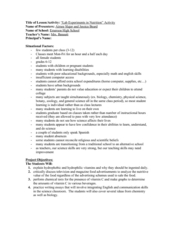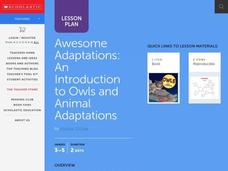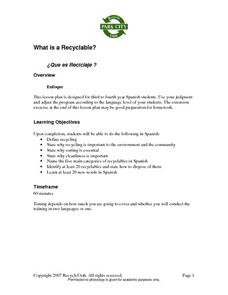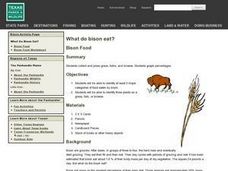Baylor College
Food Webs
Explore various ecosystems from around the world as your class discovers the interdependence of all living things. Using the provided sets of ecosystem cards, young scientists work in small groups building food webs to demonstrate the...
Baylor College
What's That Food?
Get things cooking with the first lesson in this series on the science of food. Working in small groups, young scientists make and record observations about different mystery foods. These descriptions are then shared with the class and...
Baylor College
Using Food Labels
Help your class make sense of nutrition labels with the ninth lesson of this series. After explaining the different information provided on packaged food labels, perform an activity that demonstrates the amount of sugar in a single can...
Curated OER
Food for Spaceflight
When astronauts get hungry in outer space, they can't just call and have a pizza delivered. In order to gain an appreciation for the challenges associated with space travel, young learners are given the task of selecting,...
Baylor College
Healthy Snacks
Assess your pupils' ability to identify healthy food choices in the final lesson of this series on food science. Given five different food labels, young nutritionists will rank them from most to least healthy, supporting their choices...
Howard Hughes Medical Institute
Creating Chains and Webs to Model Ecological Relationships
The sustainability of an ecosystem depends on many factors and changes constantly. Young scholars consider these factors as they use a set of cards to create food webs. They review key scientific vocabulary such as predator, prey,...
Baylor College
Safe Food Preparation
Who doesn't love ice cream? Make this delicious dessert with your class while learning about food preparation in the tenth lesson of this series. Teach about the importance of cleanliness and proper cooking techniques in order to avoid...
Baylor College
Bio Build-up
Trace pollutants through the environment in the seventh lesson of this series on the science of food. Looking at a picture of the plants and animals in an aquatic ecosystem, learners use dot stickers to represent harmful chemicals as...
Channel Islands Film
Once Upon a Time (Sa Hi Pa Ca): Lesson Plan 3
What was the most significant tool used by the Chumash? How did the environment make the tool possible? What group behaviors allowed the Chumash be be successful for thousands of years? After watching West of the West's documentary Once...
Curated OER
Lunch in Outer Space!
Students explore the challenges astronauts face while eating in outer space. In small groups, they design and construct an original model device to assist astronauts eat in a microgravity environment.
Curated OER
Dining Out With Fishes and Birds of the Hudson
While this lesson plan focuses on the birds and fish found on the Hudson River, it could be adapted for use in any classroom. Using a vocabulary list, learners explore the meaning of words like adaptation, habitat, barbel, and more....
Curated OER
Lab Experiments in Nutrition Activity
Which vitamins should be ingested daily for maximum nutrition? Learners with ispecial needs or those who are pregnant focused on television and magazines advertisements that are used to sell food products. They conduct experiments and...
NOAA
Make an Edible Coral Reef
Coral reefs are full of an abundance of life and color. Why not celebrate it with an edible coral reef? Learners and teachers alike use cake, icing, and candies to create a tasty version of a coral reef that's complete with colors,...
Baylor College
What Is a One Part Per Million Solution?
Water may appear to be crystal clear, but there could be dissolved substances present. Lab groups make a one-part-per-million of a food coloring solution to demonstrate this concept. As part of an outstanding unit about water, this...
Curated OER
History in the Making: The Tortilla
Fourth graders examine the history of the tortilla and extend the study across the curriculum. In this history of the tortilla lesson, 4th graders research the background of the tortilla, determine the ingredients, and work with the...
Curated OER
Beach Life: Spanish Banks Field Trip
Students discover beach life. In this beach life lesson, students visit a beach to find plant and animal species that live there. They discuss the life cycle and needs of some of these animals through a variety of activities.
Baylor College
What's Is Soil Made Of?
It's time to roll up those sleeves and get a little dirty in the second lesson of this series on the science of food. Investigate where plants and animals get the minerals they need to live in this two-part exploration of soil. First,...
Howard Hughes Medical Institute
The Making of the Fittest: Got Lactase? The Co-evolution of Genes and Culture
Got milk? Only two cultures have had it long enough to develop the tolerance of lactose as an adult. Learn how the responsible genes evolved along with the cultures that have been consuming milk. This rich film is supplied with a few...
Scholastic
Awesome Adaptations
Engaged learners discover how an owl beak works and how animals adapt to their environment. This task is part one of a three-part series.
Curated OER
What is a Recyclable?
Young scholars explore recycling and how it benefits our environment. In this recycling lesson, students learn to determine if an item is recyclable and sort it into 7 various categories. Young scholars discover how aluminum, glass,...
Curated OER
What Do Plants Need to Grow?
Students in an ESL classroom identify the necessary requirements plants need to grow. Using Spanish worksheets, they label each part of a plant and state their function. They are given cutouts of a picture and the Spanish word in which...
Curated OER
What do Bison Eat?
Students identify the three major categories of food eaten by bison. In groups, they collect examples of grass and forbs and press them. They complete a chart of the percentages of each type of food the bison eat in a day. They...
Curated OER
A Recipe for Reading: Asian Style Rice and Eggs
Learners read, write about, and cook with rice in this home economics lesson. They reflect on the experience eating rice at home or in other ethnic foods.
Curated OER
The Disappearing Honeybees: Tracking Honeybee Decline
Students practice graphing and other math skills to track number of honeybee colonies present in United States since 1978, discuss major crops that are dependent on insect pollinators, and examine reasons for decline of United States...























